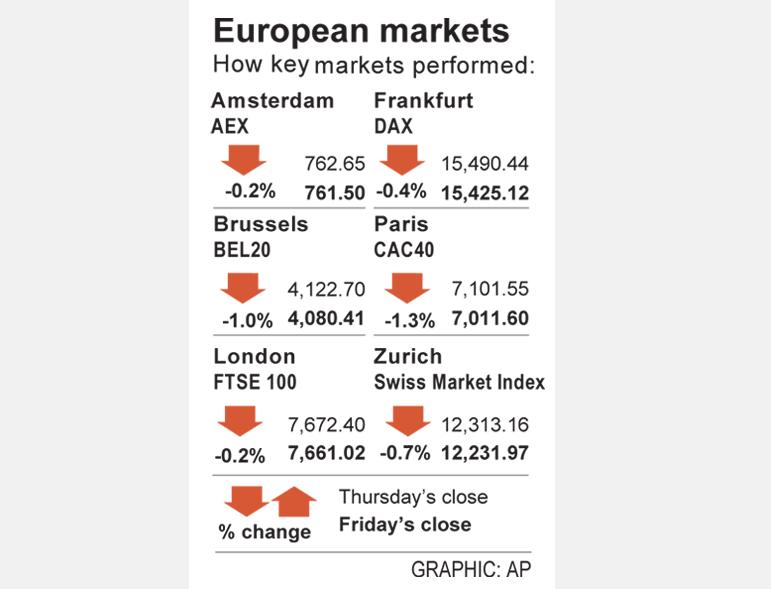Losses in technology stocks dragged European shares down on Friday, after red-hot US inflation drove up bond yields, although a positive earnings season and strong commodity prices helped the STOXX 600 log its first weekly gain this year.
The pan-European STOXX 600 index closed 0.59 percent lower at 469.57, but added 1.61 percent for the week, its best weekly showing since late December last year.
Tech stocks fell 2.2 percent, the most among their peers on Friday. The sector, along with utilities, was among the worst performers this week, under pressure from elevated debt yields.

Bond yields spiked after data showed that US inflation jumped this month, while hawkish comments from US Federal Reserve officials also raised expectations for a sharp rate hike next month.
“Strong quarterly earnings in Europe could dampen the sell-off, but until fears about a more aggressive response from the FOMC [US Federal Open Market Committee] dissipate, markets will remain under pressure,” Equiti Capital head macro economist Stuart Cole said.
However, “the Fed will do everything it can to avoid spooking the market ... akin to what we saw last month, and that means treading carefully,” Cole added.
European bond yields retreated after sharp gains on Thursday.
European Central Bank (ECB) President Christine Lagarde said that raising the ECB’s main interest rate now would not bring down record-high eurozone inflation and only hurt the economy.
Meanwhile, the German Association of German Chambers of Industry and Commerce on Friday cut its growth forecast for this year for Europe’s biggest economy to 3 percent from the 3.6 percent it had predicted in October last year, due to rising energy prices, raw material shortages and a lack of skilled workers.
Travel and leisure stocks were the best performers this week, up 7.4 percent on optimism about the easing of mask mandates in some US states.
Heavyweight mining stocks were also among the top performers this week, as expectations of improving demand in China drove up commodity prices.
In the UK, the blue-chip FTSE 100 slipped 0.15 percent to 7,661.02, but gained 1.92 percent from a week earlier.
The FTSE 100 has outperformed the STOXX 600 index this year, thanks to its heavy weighting toward banking and commodity stocks.
Britain’s economy shrank by a less-than-expected 0.2 percent in December, suggesting that — despite setbacks caused by the Omicron variant of SARS-CoV-2 — GDP grew well across the fourth quarter, data showed.
“The last month of the year wasn’t all doom and gloom ... and looking over the last quarter as a whole, there’s plenty to be positive about,” AJ Bell financial analyst Danni Hewson said.
The question now is whether this year would see the UK shake off December’s blip or whether supply constraints and rising prices would keep a lid on household consumption, which has been a key factor in GDP growth, Hewson added.

Sweeping policy changes under US Secretary of Health and Human Services Robert F. Kennedy Jr are having a chilling effect on vaccine makers as anti-vaccine rhetoric has turned into concrete changes in inoculation schedules and recommendations, investors and executives said. The administration of US President Donald Trump has in the past year upended vaccine recommendations, with the country last month ending its longstanding guidance that all children receive inoculations against flu, hepatitis A and other diseases. The unprecedented changes have led to diminished vaccine usage, hurt the investment case for some biotechs, and created a drag that would likely dent revenues and

Global semiconductor stocks advanced yesterday, as comments by Nvidia Corp chief executive officer Jensen Huang (黃仁勳) at Davos, Switzerland, helped reinforce investor enthusiasm for artificial intelligence (AI). Samsung Electronics Co gained as much as 5 percent to an all-time high, helping drive South Korea’s benchmark KOSPI above 5,000 for the first time. That came after the Philadelphia Semiconductor Index rose more than 3 percent to a fresh record on Wednesday, with a boost from Nvidia. The gains came amid broad risk-on trade after US President Donald Trump withdrew his threat of tariffs on some European nations over backing for Greenland. Huang further

CULPRITS: Factors that affected the slip included falling global crude oil prices, wait-and-see consumer attitudes due to US tariffs and a different Lunar New Year holiday schedule Taiwan’s retail sales ended a nine-year growth streak last year, slipping 0.2 percent from a year earlier as uncertainty over US tariff policies affected demand for durable goods, data released on Friday by the Ministry of Economic Affairs showed. Last year’s retail sales totaled NT$4.84 trillion (US$153.27 billion), down about NT$9.5 billion, or 0.2 percent, from 2024. Despite the decline, the figure was still the second-highest annual sales total on record. Ministry statistics department deputy head Chen Yu-fang (陳玉芳) said sales of cars, motorcycles and related products, which accounted for 17.4 percent of total retail rales last year, fell NT$68.1 billion, or

MediaTek Inc (聯發科) shares yesterday notched their best two-day rally on record, as investors flock to the Taiwanese chip designer on excitement over its tie-up with Google. The Taipei-listed stock jumped 8.59 percent, capping a two-session surge of 19 percent and closing at a fresh all-time high of NT$1,770. That extended a two-month rally on growing awareness of MediaTek’s work on Google’s tensor processing units (TPUs), which are chips used in artificial intelligence (AI) applications. It also highlights how fund managers faced with single-stock limits on their holding of market titan Taiwan Semiconductor Manufacturing Co (TSMC, 台積電) are diversifying into other AI-related firms.